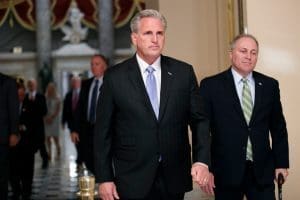House GOP votes in secret to bring back earmarks after calling them 'corrupt'
Republicans voted to return to a system they banned a decade ago.

The House Republican Conference voted by secret ballot on Wednesday to let its members resume requesting earmarks under some circumstances. The move comes after Republicans decried earmarks as “corrupt” and bragged about banning them.
Politico reported that the vote by the caucus was 102 in favor, 84 against on a resolution offered by Rep. Mike Rogers of Alabama. It will House Republicans to obtain earmarks as long as they are disclosed publicly, are justified in writing, and present no ethical conflicts of interest.
When Congress passes appropriations, it determines how much money goes to each agency and program. For years, its members had allocated portions of those funds, called earmarks, to specific projects and contractors — typically in their own states and districts — rather than leave those decisions to the executive branch.
Supporters believe that system gave Congress more of a say in where money went and made deal-making easier. Critics say it fueled corruption and waste.
After a moratorium on earmarks urged by Republicans in 2011, the Democratic House majority announced on Feb. 16 that it would bring back the system, including in the proposal safeguards to ensure earmarks go only to public institutions and nonprofit organizations.
Several House Republicans had blasted Democrats for the decision, suggesting they were returning to a “corrupt” system of “pork.” Some longtime GOP lawmakers opposing the return of earmarks had themselves made use of the system.
After the Republican caucus’ vote on Rogers’ resolution, Rep Warren. Davidson (R-OH) tweeted, “Like bugs headed for a bug light, the @HouseGOP just amended the rules to embrace Democrats’ apparently irresistible plan to restore earmarks.”
“Earmarks are tools of the DC swamp and Republicans should not participate,” tweeted Rep. Ted Budd (R-NC).
“Americans understand what Congress fails to grasp: earmarks go hand-in-hand with corruption,” said Rep. Ken Buck (R-CO).
The three were among 18 GOP representatives who signed a pledge on Wednesday not to request any earmarks at all.
But the House GOP vote sharply contrasts with the party’s previous rhetoric, which framed congressional Republicans as heroes for stopping earmarks a decade ago.
House Minority Leader Kevin McCarthy’s official website bio, still visible as of Wednesday afternoon, notes his role in ending the practice: “In 2008, Kevin successfully fought to include a ban on earmark spending in the Republican Party platform – and when House Republicans took the majority, earmarks were abolished.”
Indeed, the 2016 Republican National Committee platform, which was unchanged in 2020, includes, “Our Republican majority ended the practice of earmarks, which often diverted transportation spending to politically favored projects.”
McCarthy, Minority Whip Steve Scalise, and Republican Conference Chair Liz Cheney did not immediately respond to inquiries for this story.
Prior to the adoption of the earmark ban, Republicans were the beneficiaries of hundreds of millions of dollars’ worth of them.
According to Taxpayers for Common Sense data, McCarthy requested more than $44 million in earmarks between 2008 and 2010. Scalise obtained more than $19 million in earmarks in that time.
Published with permission of The American Independent Foundation.
Recommended

Florida abortion ban puts GOP Rep. Anna Paulina Luna’s anti-choice views in spotlight
Luna supports abortions bans with no exceptions for rape
By Jesse Valentine - May 07, 2024
Republican Caroleene Dobson wants Alabama abortion ban to go nationwide
Dobson is the Republican candidate in what will be one of the most-watched House races of 2024.
By Jesse Valentine - April 30, 2024
Direct mailers distort California Democrat Will Rollins’ record
Rollins, a former federal prosecutor, is challenging incumbent GOP Rep. Ken Calvert.
By Jesse Valentine - April 25, 2024







































































